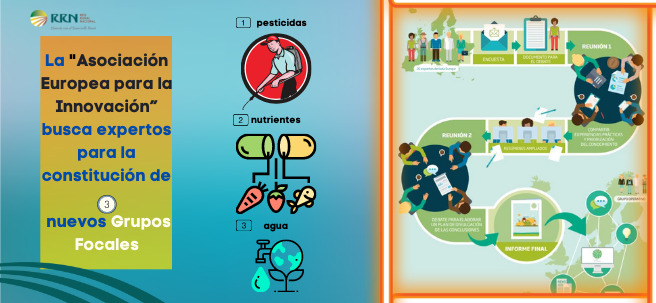
30 de November de 2021
Innovación
Cambio climático y gestión de recursos naturales
The European Innovation Partnership for Agricultural Productivity and Sustainability (EIP-AGRI) aims to accelerate innovation in the agricultural sector to achieve competitive agriculture that produces more with fewer resources and a lower environmental impact.
- The European Innovation Partnership (EIP-AGRI) is seeking specialists in the fields of pesticides, nutrients, and water management.
- The deadline for submitting applications is January 11, 2022.
To achieve this, AEI-AGRI relies on two basic instruments:
- Operational Groups : These are groups formed by stakeholders interested in solving or addressing a specific problem through knowledge and innovation, and are created on their own initiative. The group's mission is to define a specific project to act upon in an attempt to resolve a problem or take advantage of a specific opportunity in the agricultural, livestock, forestry, food, or other sectors characteristic of rural areas.
- Focus Groups : These are temporary groups of approximately 20 experts who are formed around a specific aspect important to the agri-food or forestry activity, with the aim of studying and discussing the main existing problems, as well as seeking and prioritizing innovative practices for their resolution.
EIP-AGRI is currently seeking experts across Europe to form three new Focus Groups on pesticides, nutrients, and water management. Interested parties should submit their applications by January 11, 2022, at the following link .
New Focus Groups
- Sustainable ways to reduce pesticide use in pome and stone fruit production
- First meeting: March 23-24, 2022
- Objective: How can alternative methods reduce pesticide use on pome and stone fruits and sustainably support the sector's productivity?
Fruit growers face many challenges. To produce a competitive yield, many farmers rely on pesticides. Compared to other crops, fruit production uses significantly more pesticides to control pests and diseases, weeds, and regulate growth (for example, apples are treated with various pesticides 20 to 30 times a year).
The EU and its Member States are seeking to reduce dependence on pesticides in agriculture by designing and implementing more integrated and sustainable approaches, while safeguarding the competitiveness of EU agriculture.
- Digital tools for sustainable nutrient management
- First meeting: March 15-16, 2022
- Objective: What are the key conditions, functions, and technical requirements for developing, promoting, and facilitating the use of digital applications for agricultural nutrient management?
Efficient resource management will improve the farm's economic and environmental performance. A better understanding of the natural processes affected by agricultural operations is key to improving efficiency. Digital solutions can help farmers generate this knowledge and make better farm management decisions (e.g., related to plant nutrition and health, irrigation, animal feed, etc.).
- Water: Nature-based solutions for water management under climate change
- First meeting: March 22-23, 2022
- Objective: How can nature-based solutions impact water management and contribute to sustainable agriculture under climate change?
Climate change can affect water resources through several dimensions: changes in precipitation quantity and patterns, impacts on water quality due to variations in runoff, river flows, retention and, consequently, nutrient loading, and through extreme events such as floods and droughts. These changes in the water cycle can profoundly affect agricultural production in all regions of Europe.
This group aims to promote a better understanding of the practical application of nature-based solutions
For more information on EIP-AGRI Focus Groups, please visit here .









